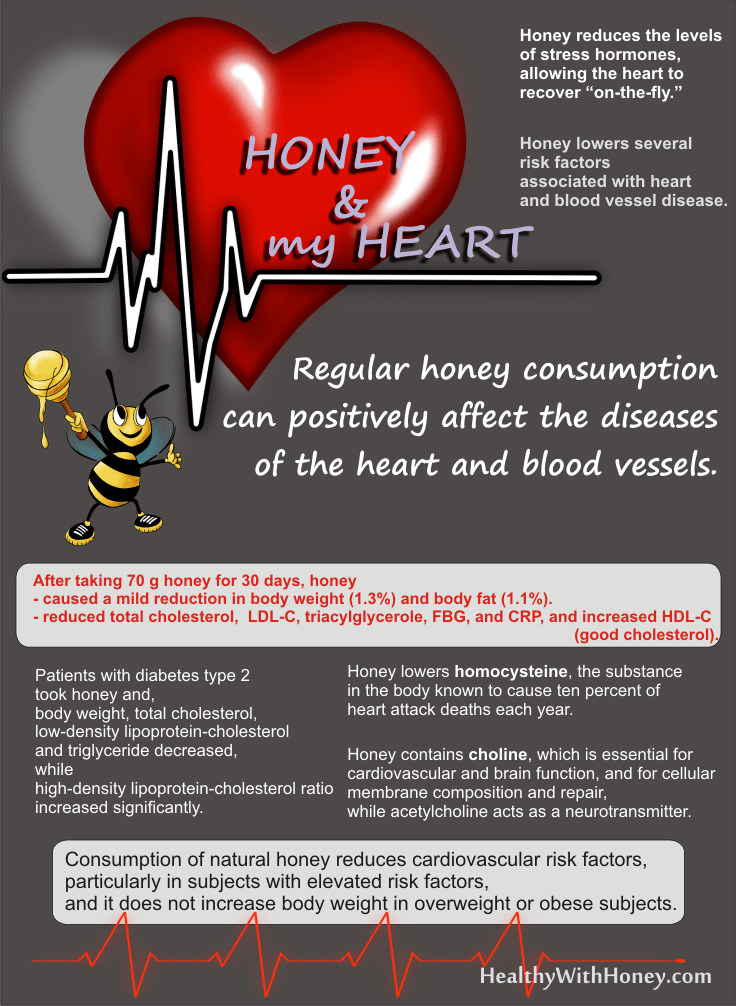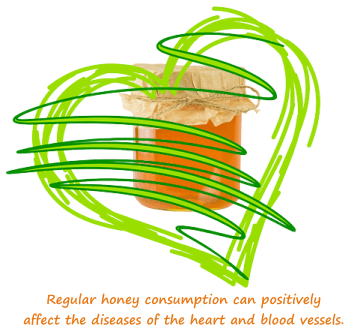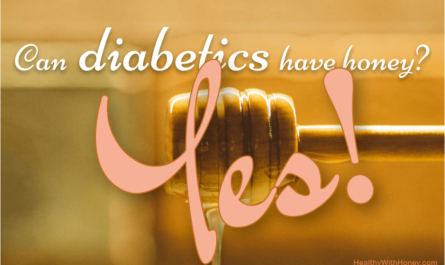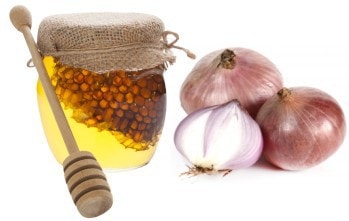Cardiac problems are #1 cause of mortality. Honey prevents and helps in treating heart problems as well as vascular ones. Even if you don’t have cardiovascular issues, or diabetes, or obesity, you may still be in danger of having a heart attack. Because we cannot always take care of our diet, and we cannot handle our emotions as well as we would like to and we still don’t know exactly how harmful these can be to the heart.
In this situation honey can be a reliable ally, helping us maintain a healthy heart. There has been proved that honey is useful not only in patients with diabetes, lipid abnormalities, and obesity but also with cardiovascular disease. (see Ibid, N Al-Waili, et al.)
Some researchers say that when it comes to cardiovascular diseases oxidative stress is too blame again. It is the one considered to contribute to the development of chronic and degenerative diseases such as cancer, autoimmune disorders, aging, cataract, rheumatoid arthritis, cardiovascular and neurodegenerative diseases (Pham-Huy et al., 2008). Propolis, pollen and honey have the highest antioxidant activities. Regular intake improves cardiovascular health by lowering blood risk factors and specific heart conditions as extrasystoles, arrhythmia and tachycardia.
Metabolic syndrome – the root of all evil!
Our heart health depends on a lot of factors: diet, lifestyle, environmental exposure, emotional life, genetics (though Bruce Lipton would probably disagree with this one) and many other factors. Many of our today conditions are considered to have their origins in what physicians have referred to since the 1990s as the metabolic syndrome.
Ron Fessenden explains this syndrom and the effect of honey on it in his well-known book The new honey Revolution, a book highly recommended. According to him, at the center of all of these diseases and conditions there are 3 common threads: chronic brain starvation, chronic sleep loss and chronic metabolic stress.
Chronic brain starvation is repeated brain starvation that occurs nightly when the liver glycogen reserve becomes depleted during sleep.
Chronic sleep loss occurs as a result of brain starvation that triggers the release of adrenalin and cortisol resulting in interrupted and short sleep.
Chronic metabolic stress is associated with repeated and excessive adrenalin and cortisol release. It is a protective mechanism initiated by the brain to provide fuel for itself when liver glycogen reserves are depleted.
While we don’t all have the same conditions, they all share the same causal elements. Not everyone who is overweight gets diabetes. And not every skinny person has normal blood glucose metabolism. Starting from a metabolic stress people can get osteoporosis, thyroid deficiency or get depressed. Some get Alzheimer’s disease or Parkinsonism or other forms of neuro-degenerative diseases. Some get cancer or coronary artery disease. Or hypertension or strokes. Others just sleep poorly every night.
Solution?
What is Ron Fessenden’s solution for this chronic metabolic stress, which underlies all these conditions? Eat honey daily and take one spoon of raw honey just before bedtime. That simple.
also see: Sleep disorders cures;
One of the best foods that fuel your brain!
How does honey help in metabolic stress?
We’ll quote Ron Fessenden here:
“The human heart never sleeps; it must always recover “on the fly.” Because of this, the most potent risk factor for heart disease is chronic exposure to increased levels of the stress hormones cortisol and adrenalin (resulting from metabolic stress). Increased levels of adrenalin increase heart rate and blood pressure. Elevated cortisol levels over time cause hypertension, arrhythmia, stroke, and atherosclerosis. Cortisol also inhibits the action of insulin, meaning that glucose is kept in the circulating blood rather than passing quickly into the heart muscle cells where it can be used for energy.
Honey consumption reduces chronic metabolic stress during rest, thus reducing the stress on the heart while it is recovering during the nighttime.”
Daily honey consumption will lower triglyceride and cholesterol levels
and increase HDL (good) cholesterol.
The fructose in honey actually protects against triglyceride formation.
What do the studies say?
The most important factors that can indicate the risk factors of cardiovascular diseases are: plasma glucose, plasma insulin, cholesterol, triglycerides (TG), blood lipids, C-reactive proteins (CRP) and homocysteine.
• AL-WAILI, N S published in 2004 the study “Natural honey lowers plasma glucose, C-reactive protein, homocysteine, and blood lipids in healthy, diabetic, and hyperlipidemic subjects: Comparison with dextrose and sucrose”, in the Journal of Medicinal Food.
He researched the effects of ingesting honey (75g) and other comparative substances: artificial honey (fructose plus glucose) or glucose on the markers mentioned above. The results showed that:
– Elevation of insulin and C-reactive protein was significantly higher after dextrose than after honey.
– Dextrose reduced cholesterol and low-density lipoprotein-cholesterol (LDL-C).
– Artificial honey slightly decreased cholesterol and LDL-C and elevated TG.
– Honey reduced cholesterol, LDL-C, and TG and slightly elevated high-density lipoprotein-cholesterol (HDL-C).
– In patients with hyperlipidemia, artificial honey increased LDL-C, while honey decreased LDL-C.
Another study found that the consumption of natural unprocessed honey for only 15 days decreased the levels of hormones in the body (prostaglandins, and prostaglandin-like substances) that cause inflammation. These substances actually suppress certain immune system functions and lead to atherosclerosis, the underlying cause of cardiovascular disease.
• In 2006 SC El-Salch, in his study “Honey Protects Against Homocysteine Elevation in Rats.” Vascular Disease Prevention, Vol 3, No 4, showed the effect of honey on homocysteine (HCY).
HCY is the normal by-product of the metabolism of the amino acid, methionine. The accumulation of HCY is associated with an increased risk of heart disease and about ten percent of coronary deaths each year are attributed to high HCY levels. Honey consumption significantly lowers HCY in the body.
• N YAGHOOBI et al. published in 2008 the study “Natural honey and cardiovascular risk factors; Effects on blood glucose, cholesterol, triacylglycerole, CRP, and body weight compared with sucrose.”, a study published by The Scientific World Journal, which was carried out in normal and overweight persons having a higher risk for a cardiovascular disease.
The patients were given 70 g honey for 30 days. The results showed that:
· in patients with normal values, honey
– caused a mild reduction in body weight (1.3%) and body fat (1.1%).
– reduced total cholesterol (3%), LDL-C (5.8), triacylglycerole (11%), FBG (4.2%), and CRP (3.2%), and increased HDL-C (3.3%)
· in patients with elevated variables, honey
– caused reduction in total cholesterol by 3.3%, LDL-C by 4.3%, triacylglycerole by 19%, and CRP by 3.3% (p < 0.05).
The conclusion of the authors:
“Consumption of natural honey reduces cardiovascular risk factors,
particularly in subjects with elevated risk factors,
and it does not increase body weight in overweight or obese subjects.”
• Honey decreases also platelet aggregation and blood coagulation, according to the study “Effect of Natural Honey on Human Platelets and Blood Coagulation Proteins.“, by AHMED, A et al. and published in 2011 in the Pakistan Journal of Pharmaceutical Sciences.
• MÜNSTEDT, K et al showed in 2009 in the study “Effect of Honey on Serum Cholesterol and Lipid Values.” published in the Journal of Medicinal Food, that honey has a positive effect in women. The study was done on with 30 persons and 30 controls and it showed that no significant decrease of cholesterol HDL and
TG was encountered after ingestion of 75 g honey daily for a period of 14 days.
While there were no effects in men, in women HDL values were increased in the controls having ingested sucrose, while in the honey group no increase was encountered, pointing out that honey has a positive effects in women.
• BAHRAMI, M et al. showed in a 2009 study “Effects of natural honey consumption in diabetic patients: an 8-week randomized clinical trial.” published in the International journal of food sciences and nutrition, which are the effects of ingesting honey on patients with diabetes type 2. The results showed that
body weight, total cholesterol, low-density lipoprotein-cholesterol and triglyceride decreased, while high-density lipoprotein-cholesterol ratio increased significantly.

• According to AL-BUKHAARI, M (1994) and AL-WAILI, N S (2004) honey can contain nitric oxide (NO) metabolites which are known cardiovascular disease risk indicators.
Increased levels of nitric oxides in honey could have a protecting function in cardiovascular diseases.
After ingestion of 80 g of honey (4 tablespoons) researchers measured total nitrite concentration in different biological fluids including saliva, plasma, and urine. They all showed a tendency of nitric oxide metabolites concentrations to increase.
Different honey types contain various concentrations of nitric oxide metabolites, dark or fresh honeys contain more nitric oxide metabolites than light or stored honey. After heating, nitric oxide metabolites decreased in all the kinds of honey.
• Greek honey exerts strong antioxidant activity on both human LDL and serum total lipoprotein oxidation, in vitro. The exact quantity of honey which can be consumed daily for major antioxidant protection has not been estimated yet. (according to MAKEDOU, K et al. in the 2012 study “Honey and its protective role against oxidation of human low density lipoproteins and total serum lipoproteins.”)
• Honey ingestion improves experimental heart weaknesses as extrasystoles, arrhythmia and tachicardia on
rats, according to RAKHA, M K et al. in the 2008 study “Cardioactive and vasoactive effects of natural wild honey against cardiac malperformance induced by hyperadrenergic activity”, published by the Journal of Medicinal Food.
• In 2013 JM Alvarez-Suarez, et al, in “Honey as a Source of Dietary Antioxidants: Structures, Bioavailability and Evidence of Protective Effects Against Human Chronic Diseases.” said that honey reduces the risk factors for cardiovascular disease by inhibiting inflammation, improving function of the lining of blood vessels, lowering blood lipids, and increasing the resistance to oxidation of low-density lipoproteins (such as LDL-cholesterol).
Some explanations on the cardiovascular effects of honey:
– Honey has antioxidant effects. Oxidative stress is implicated in the pathogenesis and/or complications of hypertension and/or diabetes mellitus. A combination of these disorders increases the risk of developing cardiovascular events. The good effects of honey on cardiovascular conditions can thus be attributed to its antioxidant properties as well as the presence of substantial quantities of minerals and nitric oxide (which relaxes blood vessels) that are directly responsible for the cardio-protective effects caused by adrenalin-induced heart disorders and blood vessel dysfunction. (RAKHA, M K et al., 2008)
It was concluded that the antioxidants in honey protect the heart against stress hormone-induced disorders and blood vessel dysfunction.
– Honey has anti-inflamatory effects and inflammation in specific parts of the human body is thought to be a major cause of cardiovascular diseases (as showed by WILLERSON, J and RIDKER, P in the 2004 study “Inflammation as a Cardiovascular Risk Factor. Circulation”).
The positive effect of honey on cardiovascular health can be explained by the anti-inflammatory activity of honey. It will reduce inflammation and improve the function of the lining of blood vessels, reducing the risk of atherosclerosis or “hardening of the arteries”.
– Honey contains 0.3-25 mg/kg choline and 0.06 to 5 mg/kg acetylcholine. Choline is essential for cardiovascular and brain function, and for cellular membrane composition and repair, while acetylcholine acts as a neurotransmitter.
– Due to its wide range of compounds including flavonoids or polyphenols (which have properties of antioxidants), peptides, organic acids, and enzymes, honey lowers homocysteine, the substance in the body known to cause ten percent of heart attack deaths each year.

************
************
References:
Bee Product Science, www.bee-hexagon.net February 2014 13
Ron Fessenden – The new honey revolution
Pictures source Pixabay.com






